In the Kalobeyei refugee settlement of nearly 200,000 residents, Finn Church Aid (FCA) increases awareness on the coronavirus and on preventing the infection.
“In the densely populated refugee settlements, diseases can spread faster than anywhere else. Now we need to act fast and start preventive actions before the virus reaches these areas,” says FCA’s Head of Humanitarian Assistance Eija Alajarva.
Information on e.g. the importance of handwashing will be shared among the residents of the refugee settlements in events, as well as through radio, text messages and posters. Information will be provided in local languages. FCA will set up handwashing facilities and distribute hygiene products such as soap and hand sanitizer.
Funds will also be used for supporting distance education. Kenya’s decision to close schools on March 16 means that there are 17,000 children and youths out of schools in the Kalobeyei area.
”Due to the school closures, there are likely to be dropouts, teenage pregnancies, early marriages, drug abuse and antisocial behaviour. Unless alternative ways are sought to encourage these learners to continue to access learning opportunities while at home, the likelihood that they will return to school will decrease,” says FCA’s Country Director for Kenya, John Bongei.
These efforts will reach 15,000 students. Through the radio, FCA aims to reach all the residents in Kalobeyei.
FCA also works to help prevent the coronavirus in Uganda and Somalia.
More information:
Head of Humanitarian Assistance Eija Alajarva, Tel. +358 40 582 1183, eija.alajarva@kua.fi
Country directors’ interviews are organised by: Head of Communications, Noora Jussila, Tel. +358 50 576 7948, noora.jussila@kua.fi
Finn Church Aid (FCA) prepares to deliver hygiene products and awareness campaigns to prevent the coronavirus from spreading within refugee camps and settlements.
People living in refugee camps and settlements are already in a vulnerable position and suffer from a lack of hygiene products and health care facilities. A spread of the coronavirus could have devastating consequences.
FCA works as the UN’s refugee agency UNHCR’s partner in the education sector and arranges education for 120,000 learners in Uganda’s refugee settlements.
“Schools are full and there are a lot of learners. It is now essential to improve hygiene conditions”, says FCA’s Country Director for Uganda, Wycliffe Nsheka.
“We arrange hygiene training for learners, teachers and health committees at the settlements. We increase the availability of hand washing facilities, sanitisers and other products for disinfection. We also print information brochures in different languages and disseminate the same information on the radio.”
Kenya closed down its schools on Monday March 16th. FCA supported schools and pre-schools are also closed. FCA now prepares an information campaign on the importance of washing hands.
The campaign will run on the radio, targeting children and their parents while schools remain closed, says FCA’s Country Director for Kenya, John Bongei. FCA plans to distribute hand sanitisers, soap and buckets also to the children’s parents.
“We will also share information from the Kenyan government on lectures held on radio. We are scouting service providers to support long distance learning, in case the schools remain closed for a longer period”, Bongei says.
FCA’s country programme in Somalia also takes measures to improve hygiene conditions in schools.
Finn Church Aid (FCA) is working together with its local Syrian church based partner in Damascus to provide the displaced people in city of Hassakeh food packages, water and winterization items during the next two months.
FCA granted 100 000 euros from its relief fund in October to support humanitarian operations in northeast Syria. Together with its local Syrian church based partner, FCA provides 200 households winterization items such as blankets and tarps as well as kitchen kits and water tanks.
“In addition to safe drinking water, we are providing food and winterization items for two shelters in Hassakeh,” says FCA’s Middle East Regional Development Manager Aleksandr Avramenko.
Besides the drinking water and winterization items, there are shortages in food supplies and medicine, as well as lack of medical assistance and primary care to children.
An estimated 200 000 people left their homes after the Turkish military operation started in northeast Syria on 9th October. Approximately 117, 000 people have returned to their areas of origin.
However, the need for humanitarian assistance remains high in northeast Syria. According to UN OCHA, 75,438 people, including around 31,700 children and 18,800 women, remained displaced from the Hassakeh, Raqqa and Aleppo governorates in the end of November.
Of those displaced, approximately 58,000 are residing in host communities and the rest are accommodated in 96 active collective shelters mostly located in Hassakeh governorate.
According to UN OCHA around 1,650,000 people are still in need of humanitarian assistance. Despite recent agreements between parties in northeast Syria aiming at cessation of hostilities, sporadic fighting has continued in the area throughout November causing more people to flee their homes.
Cash assistance allows families to decide for themselves what they need and when they need it.
Vegetables, fish, clothing, shoes. Bamboo sticks and hay for construction. In many parts of South Sudan, the selection of goods and food on the market is better than it has been in a long time.
The peace treaty has made deliveries easier, even to remote parts of the country. However, few people can afford to buy what they need. More than two million people have run from war within the country, leaving behind everything they had. On top of this, the inflation in South Sudan has raised the price of food sky-high.
In situations like this, aid organisations are increasingly resorting to cash assistance. For example, about 40 percent – a total of 990 million euros – out of the humanitarian aid given out by the European Commission, consists of cash assistance. The assistance is distributed either as cash or as coupons that can be spent on specific products.
”Cash is both more efficient and more cost-effective a way to support people in a humanitarian crisis,” says Finn Church Aid’s (FCA) humanitarian coordinator Moses Habib.
The conclusion is further supported by several studies that have been conducted on the topic. For example, the World Bank and the UN favour cash assistance during the post-crisis recovery phase.
Simply put, handing out cash ensures that a larger percentage of the assistance goes directly to those who need it.
For example, in South Sudan, food needs to be transported all the way from the capital Juba. The storage, transport and ensuring the safety of the transport alone cost a great deal, which decreases the amount of assistance reaching its final destination. The journey on the Nile or by road takes days, and robbers may attack the deliveries.
In South Sudan, FCA has handed out cash assistance in Juba, Old Fangkak, and Yei.
The money is particularly targeted to single mothers. The average family has 6 to 7 members. During FCA’s project, families receive a total of 100 to 150 euros in two to three installments. On the day of delivery, the head of the family arrives on the spot in person to be identified by using their fingerprint.
Cash distributions can prevent aid dependence
The decision to hand out assistance is preceded by a thorough needs assessment regarding how handing out cash will affect the market and the village communities. The village elders help in the assessment process by e.g. evaluating how the circumstances of individual families differ from one another and who has absolutely no safety nets in place.
There are also adverse consequences that are to be taken into consideration. These may include arguments among family members regarding how to spend the money, or an envious neighbour. Therefore, when handing out cash, the aim is to avoid situations in which out of two families living next to each other, one receives an assistance and the other does not.
Indeed, the biggest challenge is choosing who receives assistance. In Old Fangak, FCA has supported 1,000 families, but in reality, all 50,000 inhabitants have suffered from the war. Many families in need of assistance are left without.
Handing out a large amount of cash at once may even have a negative effect on the market. There is a risk of inflation or of merchants hearing of the assistance and then raising their prices.
To avoid situations like this, FCA follows-up carefully how the money is spent after delivery, in cooperation with local authorities. The observations have shown that more than half of the money is spent on food. Furthermore, parents are able to make the choice to feed their children with as much variety as possible.
A considerable number of internally displaced people spend their assistance on building a roof over their head. Moses Habib gives an example of a mother who lived in the yard of another family with her children and was mistreated by the other family. With the help of cash assistance, she was able to construct her very own clay hut for her family.
Cash distributions can also prevent aid dependence. Recipients of regular food assistance may not have the chance to help themselves and might get used to a situation in which they are the recipients of goods. With cash, they may plan their own lives themselves.
Many even save the money for future times of need. For example, farmers set aside money in order to survive a bad harvest. Some buy seeds for farming, or goats to get milk for their family.
It is important that the recipient of the cash is not bound by any conditions.
”For us, the most important thing is to allow people to prioritise their own needs instead of us giving them what we think they need,” says Habib.
Text: Erik Nyström
Translation: Leena Vuolteenaho
Illustration: Carla Ladau
Finn Church Aid (FCA) has granted 100 000 euros from its relief fund to support humanitarian operations in northeast Syria.
An estimated 200 000 people have left their homes due to hostilities after the Turkish military operation started in northeast Syria on 9th October. According to UN OCHA, around 1,650,000 people are now in need of humanitarian assistance in northeast Syria.
FCA supports the humanitarian activities of its local partner in Hassakeh, where an estimated 100,000 internally displaced people have been housed in schools, public buildings and host families. Some houses are hosting over 10 families each.
FCA is providing winterization items such as blankets and tarps as well as hygiene kits and water tanks.
“Water tanks will be crucial at this stage, since the local water plant is damaged. Besides drinking water, there are also shortages in food supplies, medicine, lack of medical assistance and primary care to children,” says FCA’s Regional Director for the Middle East Ashraf Yacoub.
Humanitarian needs in the region are increasing, while instability threatens the humanitarian response. Many aid agencies have suspended or relocated their programmes and staff.
“The humanitarian situation in the area is rapidly deteriorating and the humanitarian access to the area must be secured by all sides,” says FCA’s Head of Humanitarian Assistance Eija Alajarva.
More information:
Ashraf Yacoub
Regional Director, Middle East (in Damascus until 21st October)
+963 9986 66658
Eija Alajarva
Head of Humanitarian Aid
+358 40 582 1183
Yei was South Sudan’s second biggest town before the civil war forced people out of the country in 2016. Three years later, conditions in Uganda’s refugee settlements and a hope of peace push people to return.
Finn Church Aid’s (FCA) operations in South Sudan expand into the country’s war-torn Equatoria region. Yei town is the main centre of Yei River County, which was heavily affected by fighting since 2016.
Yei used to be an important trading point and the main food supply for the capital Juba as well as other parts of the country, says FCA’s Livelihoods Officer David Oliver Taban, who heads the new field office.
The civil war forced people to abandon their homes and leave their farms to wither. However, this year has seen a stable improvement in the security situation and many have returned to assess the situation.
“They find that all their property is destroyed or looted, and they need support for rebuilding their lives when they decide to stay”, Taban says.
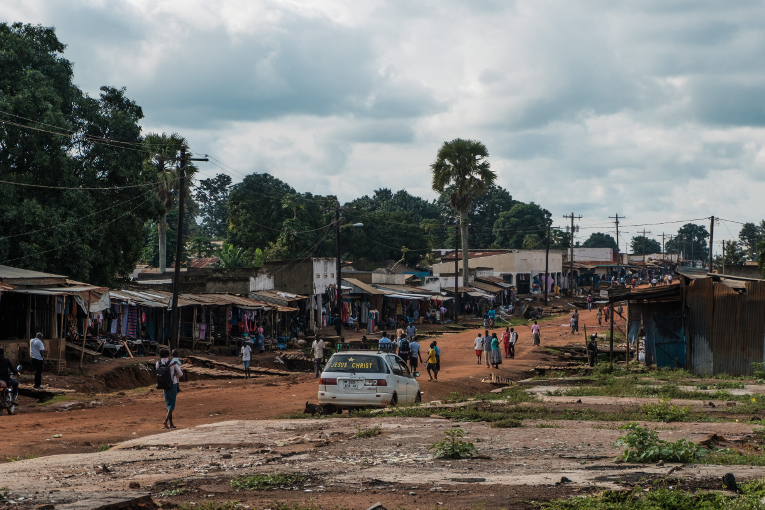
The inhabitants of Yei abandoned their hometown almost completely when fighting spread to the county in the summer of 2016. Most sought refuge in neighbouring countries.
Situation still unpredictable, repatriation a private decision
A careful optimism after the peace deal signed in September 2018 attracts many returnees. On the other hand, many feel that they do not have a choice due to a severely underfunded humanitarian response in Uganda. The returnees mention cuts in food rations and lack of opportunities for secondary education.
“These are people who used to farm vast swathes of land and feed the entire country. The land given for cultivation in Uganda is very limited, and other job opportunities are scarce”, Taban says.
Yei’s town centre has seen a stable increase in business. Maize and vegetables are widely cultivated, and the government says the roads are safe for transporting goods from an increasing number of locations, including Juba.
Farming is however still limited to the immediate proximity of the town. Armed groups who did not sign the peace deal are still at large in the surrounding villages, and violent incidents and robberies are still reported. UNHCR does not deem repatriation from Uganda safe because of these risks.
FCA’s Humanitarian Coordinator Moses Habib calls the security situation unpredictable.
“The return to Yei is a private decision, but as FCA, we need to be where the humanitarian needs are. We expect people to start returning in greater numbers by the end of the year”, Habib says.
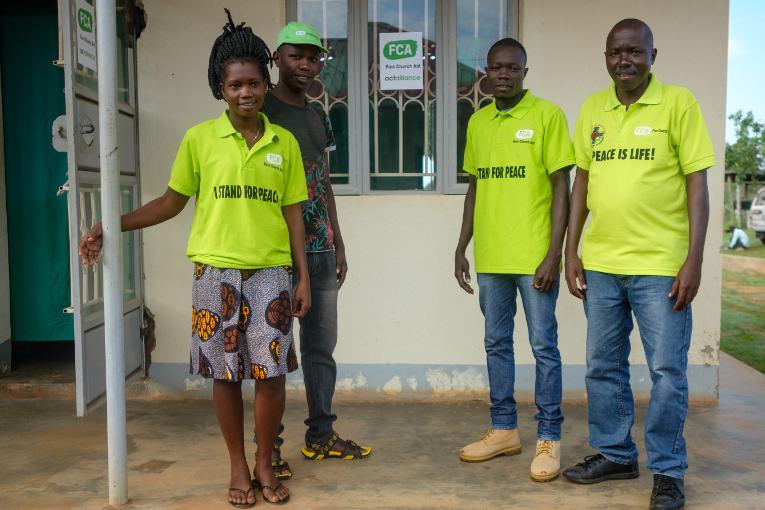
FCA’s new field office in Yei starts with four staff members.
FCA’s operations expected to expand rapidly
FCA started its first project in Yei in 2017, when 1,620 families received cash support funded by the Finnish Ministry for Foreign Affairs. The beneficiaries bought food from the market and maintained businesses.
A new phase of cash distribution starts in August with funding from the Icelandic Church Aid, targeting a thousand families. This support can help families resettle, invest in businesses and cultivate. FCA selects the most vulnerable families carefully in a process that targets primarily women-headed households.
“The support is unconditional, which allows returnees to address their most pressing needs, which usually involve feeding their families, rebuilding their houses, cultivating and starting businesses”, Habib says.
“We expect to expand our operations rapidly into other areas, like livelihoods and peace building. The community needs reconciliation after a conflict that has pitted many against each other.”
Photos: Sumy Sadurni
Before, as many Jordanians, we used to take up a two-hour drive to Syria on weekends to enjoy the green nature, stay by the coast, purchase good quality goods, and come back home. After nine years of war, it took us a five-hour drive to reach Damascus, but nothing was the same anymore. The border barely exists, the green road is full of damaged buildings on both sides, and there are countless checkpoints.
I visited Syria as part of an educational project that FCA Middle East office is implementing in rural Damascus. The war has been put to rest in most of the governorates of Syria, except some North-West areas like Aleppo and Idleb.
Our destination, the Old Town of Damascus was, was thankfully kept safe during the conflict. The old streets, the souqs, the mosques and the churches are still standing, witnessing sadly the damage of other old towns. There is not much war remains inside Damascus, and life seems normal. The city is buzzing with people, despite that you can definitely sense the pain and the suffering in people’s eyes, voices, and stories.
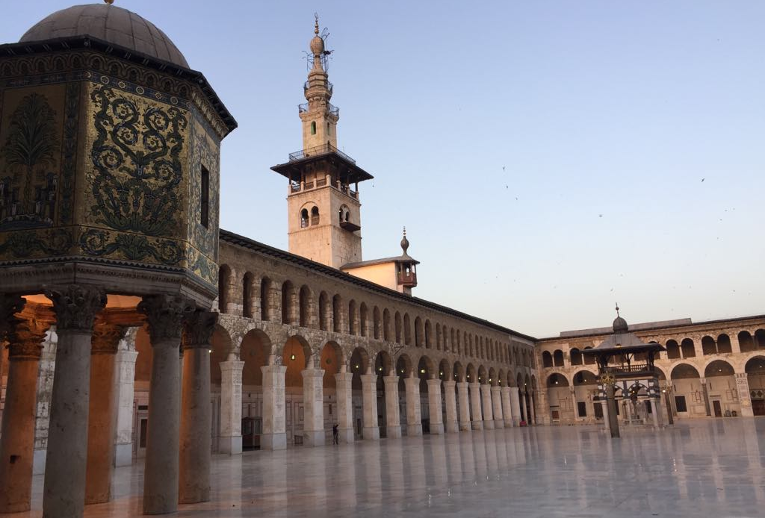
Umayyad Mosque in Damascus
During my visit, I facilitated a Training of Trainers (ToT) for 40 teachers and administrators, who despite all the obstacles and the frustrations came all the way to participate in the training actively, energetic and full of life. The training mainly focused on teacher competencies, planning for teaching, modern teaching strategies, evaluation strategies, classroom management, and facilitation techniques.
The ideas, the discussions, and the laughs we shared in the 6 days training are unforgettable. I was keen to join the participants at their tables during the breaks, and listen carefully to their stories; the woman who lost her father, the man whose house was destroyed, and the families who were forced to leave their hometowns and start over a new life from scratch.
“He was my only brother, but he was killed by a land-mine”, Diana describes.
During the training, the one and only question that kept racing through my mind: “Is war worth it?”
Over 2 million children – over one third of Syria’s children – are out-of-school and 1.3 million children are at risk of dropping out.
Nine years now of the prolonged conflict in Syria, and the needs are still huge, severe and demanding. As the number of IDPs estimated to be 6.2 million, some areas became overcrowded, resulting in the drainage of resources to the point that over 8 in 10 people in the country now live below the poverty line. As a sample of those areas, we visited Jaramana and Sahnaya in rural Damascus.
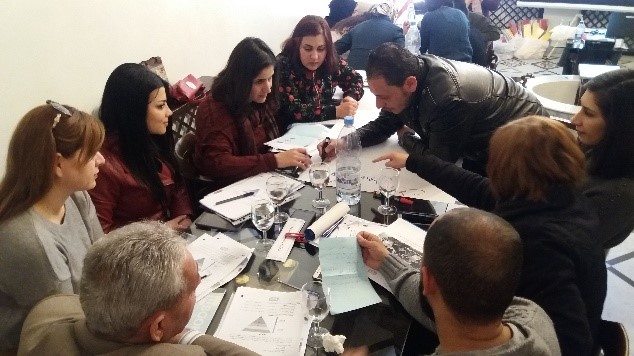
ToT training in Damascus
During our trip to Jaramana, my colleagues and I conducted field visits to the institutes that provide informal education for dropout students. They also provide remedial classes for 9th and 12th grade students to help them pass the national exams. Gladly, I had the chance to conduct coaching visits to some classes, in the purpose of observing and providing feedback. It is said: “Never underestimate the power of dreams!” That is exactly what is left for those children, dreams of a better future, where no more war or killing around.
In one class that I was coaching, the teacher was fully engaged in teaching the students a poem about freedom and patriotism. He asked all the questions, they replied with all the perfect answers, but I wonder if one of those students had a peek at the window, what he would think!
During that class, the one and only question that kept racing through my mind: “Is war worth it?”
Erbin: A tale of a devastated city
Later, the car moved slowly away from Damascus. Gradually, the noises started fading away until we found ourselves entering a world of silence; a town with no inhabitants, streets with no cars, even no birds, dogs or cats. It was more like a ghost town! And so we were informed that we arrived to what was left from Erbin, in East Ghouta.
In Erbin, you may drive for more than 10 minutes searching for a human being, or any sign of life, or even a non-damaged house, but you find nothing but destruction. In 2018, Erbin was exposed to restless heavy bombardment and raids for months, even hospitals and schools were repeatedly hit. One of the schools was used as a shelter. School activities were suspended for long period due to safety and protection reasons! According to OCHA report 2019, 10076 people are in need in Erbin.
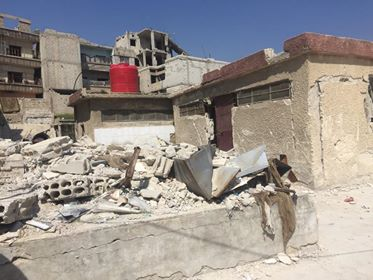
“The teachers haven’t been paid for a year now, but we show up every morning for the sake of those guiltless children”, a school principal explains.
FCA supports the rehabilitation of two schools in Erbin. Classrooms and washrooms will be renovated and walls will be painted.
On the same trip, we visited a vital center that St. Ephrem Patriarchal Development committee (EPDC) – FCA’s local partner – runs. It provides psychosocial support and informal education. The desire to live in better circumstances was a powerful motive driving everyone to work like busy bees, the hope of a better future could be easily sensed in every corner, it was contagious!
Also in Erbin, the same question kept racing through my mind: “Is war worth it?”
The trip came to an end, I went back home safe. The memories, stories and feelings I carried with me are irreplaceable. The visit was overwhelming, and it was only 12 days long. What about the Syrians, who live amidst those memories every single moment of every single day?
In Syria, one thought kept racing through my mind: “Is war REALLY worth it?”
Heba Suleiman
The writer works as a regional education adviser for Finn Church Aid
Finn Church Aid (FCA) has granted 100 000 euros from its relief fund to Yemen. After years of ongoing conflict, the water supply in the country has collapsed, and different waterborne diseases, including cholera, torment especially the children and elderly in vulnerable condition.
FCA’s emergency assistance is channelled through a local partner to strengthen the water supply in Dhamar governorate, where the conflict has left over 200 000 people without water.
”Yemen has not been FCA’s programme country, but we want to be part of the emergency relief as the needs in the country are massive. As a consequence of the prolonged crisis, needs are still growing and people suffer from famine, undernutrition and lack of potable water and health care,” says FCA’s Head of Humanitarian Assistance Eija Alajarva.
According to estimations, the cholera epidemic in Yemen is the largest in the world. The World Health Organisation WHO estimates that there are over one million cholera cases in the country.
With FCA’s support, two water systems will be constructed to secure the water supply of 8 000 people in Dhamar. In addition, water committees will be created to manage the systems and control the quality of the water. Furthermore, solar panels will be installed to pump the water.
Yemen has been one of the poorest countries in the Middle East even before the conflict started in 2015. Years of war have had devastating effects on the country, and the humanitarian crisis has worsened alarmingly during the year 2018 and spring 2019. According to the UN, three quarters of the population of 30 million are in need of humanitarian assistance.
The family has nothing but rotten maize to eat. Rescuers have had difficulties in delivering aid to the isolated Buzi area.
Buzi, Mozambique. Amelia Tausene, 35, has a house and a field of maize and rice. The field has been her family’s source of income. Family has lived in Buzi for a long time, and they’ve seen the Buzi river flooding from time to time. Usually it has not been bad enough to disturb their daily life.
According to Amelia, harvests have never been troubled by floods before. This time flood waters took everything, including seeds for a new crop. Amelia and her family, have nothing left, she says.
Her children Noel and Gustavo show their school books, which are now useless.
From what’s left, you can see that they’ve been diligent with their homework. Their school is also destroyed, and the two boys don’t know when they can continue learning again.
Buzi district and town seem to be one of the worst hit areas of cyclone Idai, which destroyed houses and caused devastating floods two weeks ago in Mozambique, Zimbabwe and Malawi.
Amelia’s family has spent the last days searching for remains of their maize. The little that they have found, is now drying out in the sun. That’s also what they’ve been trying to eat, but it’s rotten and doesn’t taste good. Still, that’s all they have for food at the moment.
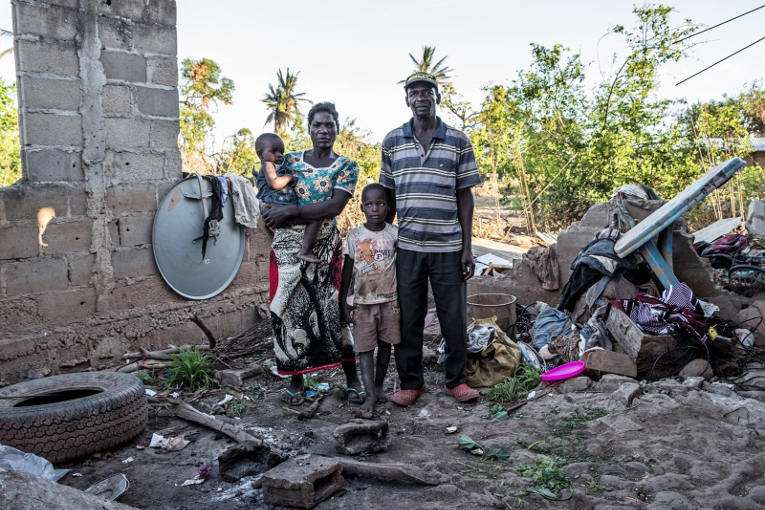
Lorenzo Armando, 63 and Marieta Manuel, 44, have seven children; in the picture Ruben, 6, and grandchild Maja. Photo: Natalia Jidovanu
“We were only thinking of staying alive”
The cyclone was something Amelia had never experienced before. But what came after was worse. It rained for two days after the cyclone, and, at the beginning of the third day, at 6 AM, the water level started rising rapidly.
Amelia’s house is on higher ground, almost at the level of the nearby tree tops, and by 11 o’clock Amelia, her husband and the three children were stuck on their roof. No one had left their houses, because they simply did not realize how bad it would get.
They had nowhere to go. However, they were lucky to be on the roof – other people had only tree tops. Amelia and her family had to stay on the roof for four days. They had nothing to eat, and the children were complaining, but she could not do anything.
They survived by drinking flood water until a rescue boat came and took them down, and to a temporary shelter.
Local rescuers tell us how a mother in this same area was stuck on a tree top with her infant. After a few days she dozed off for a few seconds and dropped her child in the water. People of this isolated area have been through a lot, too much.
For us, it took 4,5 hours to reach Buzi town by road from Beira. By boat on Buzi river it takes three hours. The river is the reason why so many people have settled in this area. It’s ideal for farming.
“The worst thing about the days of being stranded on the roof was hunger”, Amelia says. “We were only thinking of staying alive.” Now, when the floods are gone, Amelia has no idea what she’s going to do.
“You see that I’m just sitting here, and this is what I have left”, she says, pointing at her destroyed house and the maize field that’s still partly under the water.
“I don’t know what to do.”
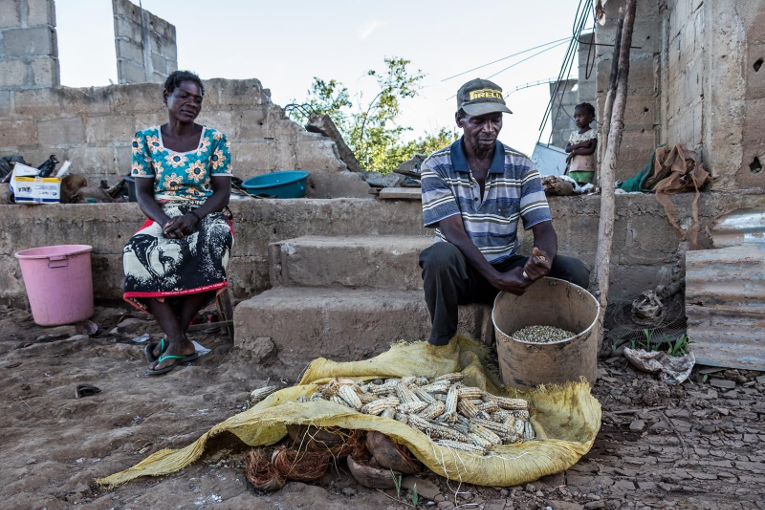
Lorenzo and his family now stay in Buzi town, in the ruins of their son’s house. Their own house was next to it, but is now completely destroyed. Photo: Natalia Jidovanu
Farmer’s nightmare
Lorenzo Armando, 63 was born in Buzi. He has been farming since he was young. He says he has never seen a weather like this in his 63 years. In 2000, there was a small cyclone and flood, but water levels never reached as high as this time. Floods have previously stayed near the river Buzi, which runs through the town of Buzi.
Lorenzo had 1,5 hectares of land almost ready to be harvested, but now all that is left and edible fits into a bucket. And, it tastes bad when cooked.
Farming has become more complicated during the recent years; one cannot be sure when to expect the rains to start. When he was younger, rains were easy to predict. Now, the cycle of seasons is unreliable, and dry spells have become longer. That has a negative effect on the harvest.
On the day of the storm, Lorenzo and his family were together in their house – his wife and two children Ruben and Maya. When the winds got unbearable, they left the house, and shortly after they saw the house collapse.
Now there’s nothing left. But the worst was, when water started rising rapidly, two days after the cyclone. During those two days they had been trying to recover some clothes and equipment from the ruins of the house, and had left it outside. When water reached them, they started to move their belongings to a higher ground, but by the time they were done, water had already reached the same level. They panicked and decided to flee to a nearby guesthouse, which had two floors. They escaped to the top floor and stayed there until they were rescued.
Now the couple sleeps out in the open air. They have heard of people in the area, who have lost their lives, or been swept away by the floods. Lorenzo and his family consider themselves lucky to have survived, but they don’t know, what to do now in order to recover from their losses. Farming was their livelihood, and now the harvest is gone.
Buzi’s isolation makes it hard to receive relief. Luckily, they have received some rice and pasta as emergency relief.
What’s next?
“To try to build at least one room for the family to live in”, Lorenzo says.
Text: Erik Nyström/FCA,
Photos: Natalia Jidovanu/FCA
Finn Church Aid together with other aid organizations have joined local partners to fight cholera in Mozambique.
Jacinta Francisco, 40, is from Beira and has five children. We meet Jacinta and children at a temporary shelter set up in Muavi 1 Primary School. The school building was also damaged by cyclone Idai almost two weeks ago, but now it serves as a shelter for the most vulnerable families.
Before the storm, 2500 pupils attended school here. Now, the school is closed because of the damages.
The day before the cyclone hit Beira, Jacinta was aware that a storm was coming. But she could not know how bad it would be. Jacinta just decided to prepare dinner earlier than usual, so the family would have eaten before the storm reached Beira.
At night the winds blew so hard the coconut and mango trees were torn down by their roots. The roof of Jacinta’s house flew off and bricks were starting to fall. Fridge and television got broken. When Jacinta realised that they could die, she took her family and ran towards their mother’s house, only to find her in the same situation. They all huddled together in the room they considered safest and waited for the morning to come. When the day broke, they went to look for a shelter.
“At least no one from my family died”, Jacinta says. “But future seems very difficult.”
Only the foundation of the house remained intact in the storm. Jacinta says she has no money to rebuild it. At the moment, she cannot think of anything else than making sure that her children have something to eat. “That’s the only thing I can do now.”
Jacinta’s family has no house, no clothes, no means for supporting their kids with school. Only two of their textbooks were found among the ruins of the house. Jacinta’s husband used to work at a school, but now he stays by the ruins, hoping to be able to fix it. But he doesn’t have any money.
Jacinta used to sell tomatoes and other vegetables, but her stall and supplies blew away along with everything else.
Life at the temporary shelter is tough because the shelter is very crowded. Majority of the inhabitants are women and children. One classroom is allocated for men and older boys, and six for women and children. People sleep on the floor next to each other squashed in like sardines and without mattresses. Jacinta says its impossible to even turn around. Many decide to sleep outside to have their own space.
Jacinta waits for the day when she could have a small, private space for her and her children, and a blanket to sleep on.
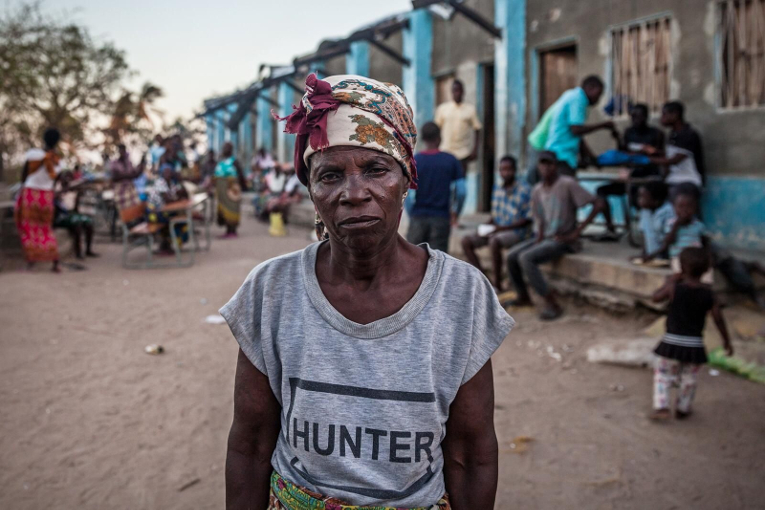
Adelia used to farm her own plot and sell tomatoes on the street. Now she has lost everything and cannot imagine what she would do next. Photo: Natalia Jidovanu
Threatened by cholera
Jacinta and her family have shelter, but they are not safe from other dangers. Cholera is now a big threat to all. The number of cholera cases is rising rapidly. On Monday, the UN declared the number of cholera cases only in Beira to be one thousand. One person has died of cholera in Beira.
This frightens Jacinta. She feels uncomfortable living with so many people who have varying hygiene habits. According to her, not everyone even uses toilets for their needs. She also worries about the quality of water – there is no way she could make sure that it is clean.
ACT Alliance members have joined local partners to fight cholera and other diseases in Mozambique. Partners are starting to hand out water cans and water purifying equipment in Beira area in the coming days.
In the same shelter, we meet also Adelia Manhazo, who does not know her age, but guesses she must be around 60. She has four children, and no husband.
In Beira, people not only lost their home, but also their livelihoods. Most of the people at the shelter were street vendors selling bananas and tomatoes. Some used to cultivate their own plots of land.
Adelia says she appreciates that she gets food at the shelter, but she is suffering a lot. Her house and her source of income were swept away in one single night. She used to farm on her own plot, and earned money by working on other people’s land as well.
She has no idea what she will do the day she will be sent away from the shelter. This is the situation of most of the shelter’s inhabitants.
Adelia was at home with four children and her cousin’s baby, when the storm hit her house. When the winds were on their worst, her neighbours came to rescue her and her children. She let them take the children, but refused to leave herself until they forced her to come. Just after they had escaped, she saw the house collapsing.
They all sought refuge in this school. Adelia explains how almost every morning after breakfast, people from the shelter wander back to their former homes to see if there is anything they could do to restore their property. Two weeks after the storm it is still hard for them to accept that they have lost so much.
Text: Erik Nyström, photos: Natalia Jidovanu
Factbox
Cholera is a water-borne disease that spreads through water, food and bad sanitation. The response from ACT includes water purification tablets, WASH and food, among other things.







